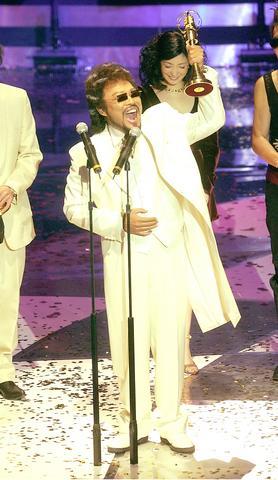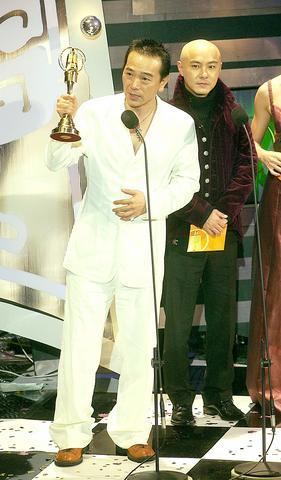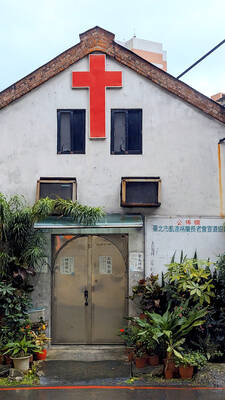Public Television Service (
PTS won in 11 award categories. The best lead actor honor went to Chang Chen-kuang (

PHOTO: TAIPEI TIMES
The awards ceremony took place last night at Sun Yat-sen Memorial Hall in Taipei, and opened with a star-studded red-carpet walk that drew hundreds of fans.

PHOTO: TAIPEI TIMES
Croatian pianist Maksim, Korean actors Ahn Jae-wook and Ha Ji-won, both of whom have large fan bases in Taiwan for their TV dramas, pop diva Stefanie Sun (
The four-hour gala event was hosted by Kevin Tsai (
PTS demonstrated its power for producing quality programs at the Golden Bell Awards -- Taiwan's answer to the Emmy Awards -- especially in drama and cultural programming.
The TV company took home four awards for its programs, including the best TV drama Banquet (
PTS won 18 award categories at Golden Bell Awards last year, well ahead of all the other TV stations in Taiwan.
In the variety show categories, Taiwan's veteran TV host Chang Fei (張菲) won the award for the best TV host for variety shows for his popular show Variety Big Brother (綜藝大哥大). The award for best variety program, however, went to Variety Sum-up (綜藝大集合).
Having hosted TV shows for 30 years, Chang expressed his gratitude to all his guests who have been entertained and "tortured" in his shows. He also gave thanks to his alleged girlfriend from Belarus, Margarita, who serves as the assistant hostess and comedienne in his show.

It is a soulful folk song, filled with feeling and history: A love-stricken young man tells God about his hopes and dreams of happiness. Generations of Uighurs, the Turkic ethnic minority in China’s Xinjiang region, have played it at parties and weddings. But today, if they download it, play it or share it online, they risk ending up in prison. Besh pede, a popular Uighur folk ballad, is among dozens of Uighur-language songs that have been deemed “problematic” by Xinjiang authorities, according to a recording of a meeting held by police and other local officials in the historic city of Kashgar in

The Directorate-General of Budget, Accounting and Statistics (DGBAS) told legislators last week that because the Chinese Nationalist Party (KMT) and Taiwan People’s Party (TPP) are continuing to block next year’s budget from passing, the nation could lose 1.5 percent of its GDP growth next year. According to the DGBAS report, officials presented to the legislature, the 2026 budget proposal includes NT$299.2 billion in funding for new projects and funding increases for various government functions. This funding only becomes available when the legislature approves it. The DGBAS estimates that every NT$10 billion in government money not spent shaves 0.05 percent off

Dec. 29 to Jan. 4 Like the Taoist Baode Temple (保德宮) featured in last week’s column, there’s little at first glance to suggest that Taipei’s Independence Presbyterian Church in Xinbeitou (自立長老會新北投教會) has Indigenous roots. One hint is a small sign on the facade reading “Ketagalan Presbyterian Mission Association” — Ketagalan being an collective term for the Pingpu (plains Indigenous) groups who once inhabited much of northern Taiwan. Inside, a display on the back wall introduces the congregation’s founder Pan Shui-tu (潘水土), a member of the Pingpu settlement of Kipatauw, and provides information about the Ketagalan and their early involvement with Christianity. Most

The People’s Republic of China (PRC) was out in force in the Taiwan Strait this week, threatening Taiwan with live-fire exercises, aircraft incursions and tedious claims to ownership. The reaction to the PRC’s blockade and decapitation strike exercises offer numerous lessons, if only we are willing to be taught. Reading the commentary on PRC behavior is like reading Bible interpretation across a range of Christian denominations: the text is recast to mean what the interpreter wants it to mean. Many PRC believers contended that the drills, obviously scheduled in advance, were aimed at the recent arms offer to Taiwan by the